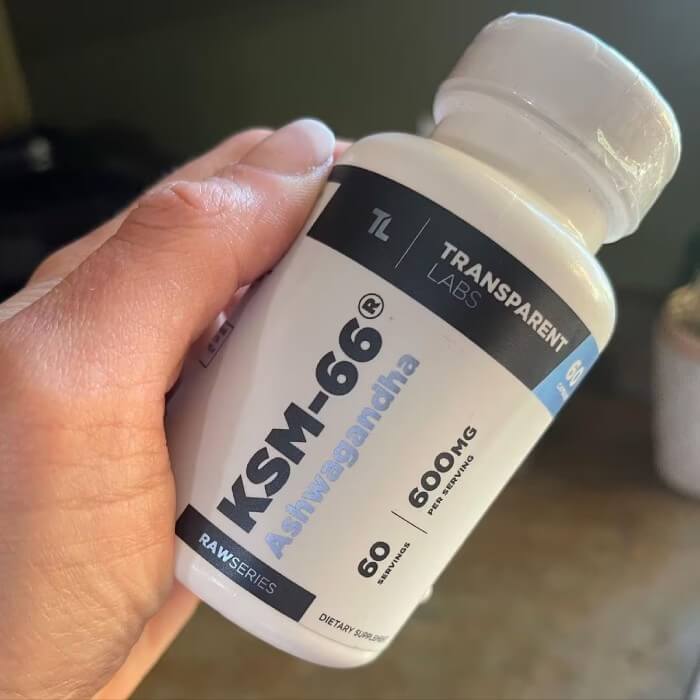Ashwagandha For Weight Loss – Does It Work?
Ashwagandha has been used in traditional medicine for years with a wide range of purported benefits which include stress relief, muscle strengthening, and sexual health.
Research into ashwagandha for weight loss has more recently looked into possible mechanisms, with several indirect ones suggested.
We’ve explored this question below and discussed the bigger picture when starting your weight loss journey.
Ashwagandha for weight loss – Several indirect mechanisms have been suggested including lower cortisol, improved sleep quality, reductions in oxidative stress, and possible improved blood glucose metabolism. The focus should be on a sustained calorie deficit and consuming adequate protein, with ashwagandha helping.

Ashwagandha For Weight Loss – Does It Work?
Ashwagandha is a herb that originates in India but can be found in several parts of the Middle East and Africa. It’s a small evergreen plant with yellow flowers and roots which can be processed into powder or an extract and taken as a supplement.
Ashwagandha is an ‘adaptogen’ which means it helps to respond to stressful situations and maintain overall balance. This is the main rationale for why ashwagandha supplementation may have indirect beneficial effects on weight loss through its adaptive properties on markers of health and well-being.
With this, does ashwagandha make you lose weight? Whilst research is still evolving, promising studies have shown higher amounts of weight loss following ashwagandha supplementation compared to a placebo. Whilst more studies are still needed to draw firm conclusions, some potential mechanisms have been suggested which we’ll discuss in more detail below.
How Can Ashwagandha Indirectly Help With Weight Loss?
Weight loss is a dynamic process meaning that it can be influenced by many factors that can change with daily activity. These are the main purported mechanisms that may indirectly contribute:
1. By Reducing Cortisol
During periods of chronic stress, our body produces a large amount of cortisol. Also known as the ‘stress hormone’, chronically elevated cortisol can have a number of detrimental health effects which can contribute to being overweight.
Cortisol increases our ‘fight or flight’ response in our sympathetic nervous system which is basically the body’s way of deciding if to fight the stressor or go into a state of shock.
The relationship between stress and cortisol can sometimes be complicated. Whilst periods of stress may increase our cortisol levels, chronic stress has also been shown to decrease morning cortisol, both can affect weight management.
Alongside this, cortisol may contribute to the redistribution of fat around our abdominal area, decreasing our health status.

Ashwagandha is an adaptogen which means it helps our body adapt to stress and bring it back to a normal state. Supplementing with ashwagandha has been shown to lower cortisol levels and therefore should help with weight loss alongside other important lifestyle factors.
2. By Improving Sleep Quality
When we wake up in the morning, our cortisol levels peak. This makes us feel alert and awake, ready to start the day. If our cortisol level is raised throughout the day due to stress and other factors, our circadian rhythm (sleep pattern) will suffer.
Sleep is vital. Our bodies need it to rest and recover. Without it, many of the vital functions our body performs will slow down or stop altogether.
Clinical trials showing positive correlations between reductions in cortisol and quality of sleep suggest that ashwagandha supplementation may also improve our quality of sleep. Without adequate sleep, it is highly likely that the endocrine system won’t function properly.
3. By Reducing Oxidative Stress
Oxidative stress occurs when free radicals or reactive oxygen species accumulate in the body. These are both known as harmful compounds and can damage DNA and cells.
Oxidative stress has been linked to a number of detrimental effects including chronic disease and faster aging. Alongside this, it’s thought to possibly contribute to obesity by changing food intake behaviors and contributing to white adipose tissue build-up.
Ashwagandha has antioxidant properties, meaning it helps to fight the build-up of free radicals and lowers oxidative stress. Promising studies show increased activity of beneficial antioxidants like glutathione with ashwagandha supplementation.

4. By Improving Blood Glucose Control
Throughout each day, we use glucose as fuel for exercise and daily activity. The level of blood glucose in our body is efficiently managed by insulin and glucagon. Insulin signals our cells to take in glucose by binding to a receptor and activating glucose transporters which in result lowers our blood glucose level. Glucagon works to counterbalance this by breaking glycogen (stored glucose) back into glucose which is then released into the bloodstream when there is such a need.
When our insulin levels are consistently elevated, our ability to burn fat as energy is impaired therefore it can contribute to fat storage and weight gain.
Supplementing with ashwagandha may have a positive effect on our blood glucose and insulin control, with a meta-analysis of 24 studies showing reductions in blood glucose and insulin following supplementation.
How To Use Ashwagandha For Weight Loss
Ashwagandha can be taken as tablets, capsules, powder, and liquid. It can also be ground up raw and added to various liquids.
Studies looking into the beneficial effects of ashwagandha have tended to use daily amounts of 250-600 mg split into two doses. The clinically relevant dose is suggested to be 600 mg per day for 8 to 12 weeks, with studies suggesting this as the sweet spot with little side effects.
Here’s how to take it in different forms:
As Tablets/Capsules:
- Take the tablets or capsules with water and swallow whole
- Following a meal is the best time to take ashwagandha for weight loss to reduce the possibility of unwanted side effects such as GI distress
As Powder:
- Add the powder to a glass of hot water and let simmer
- Stir well and consume twice daily
- You may also mix it with other liquids depending on your taste preference

What Conditions Must Be Met For Successful Weight Loss?
Supplements such as ashwagandha should be taken whilst following the fundamentals of nutrition according to your health goals. They are not designed to replace parts of the diet or make up for poor adherence. When trying to lose weight, here are the conditions needed to ensure successful weight loss:
1. Sustained Calorie Deficit
To lose weight successfully, you need to burn more calories than you consume. This is known as a calorie deficit or being in a negative energy balance. If you eat more calories than you burn, you’ll be in a calorie surplus/positive energy balance and won’t lose weight.
Whilst this sounds simple enough, multiple factors can contribute, making weight loss a dynamic process that requires sustained focus to be successful.
Generally speaking, there are two main ways to achieve a calorie deficit. These are – increasing calorie expenditure or lowering calorie intake, with both helping to achieve the same goal. Whilst it’s up to you to decide your approach, many well-known experts suggest a balance of both. Aside from calorie expenditure, exercising regularly provides a host of health benefits such as reducing the risk of diabetes, heart disease, and certain cancers. Alongside this, mental benefits include improvements in mood and quality of life.
Remember that setting a realistic weight loss goal that’s easy to manage and measurable is important to ensure long term adherence. If there isn’t a specific need, look to set a smaller more sustainable rate of weight loss that you can stick to long term rather than an aggressive weight loss strategy that’s hard to maintain.

2. Enough Protein
Consuming adequate protein or even increasing it above your normal intake has a host of proven benefits that help support successful weight loss.
Protein is highly satiating which basically means it helps to suppress your appetite by keeping you fuller for longer. This can lead to a reduction in calorie intake without you even knowing you are doing it. Multiple studies have shown a lower calorie intake when participants eat a higher protein amount.
The reduction in calorie intake can help you to maintain a negative energy balance and therefore increase your chances of successful weight loss.
Alongside this, protein has a much higher thermic effect of food than carbohydrates and fat. This is basically the amount of calories you use to digest and metabolize your food after eating it.
This alongside several other mechanisms increases your metabolic rate meaning you burn more calories over the course of a day. Whilst the amount varies between individuals, studies estimate that a higher protein diet leads to approximately 5% extra calories burned each day.
3. Flexibility In Diet To Improve Adherence
One of the most overlooked factors influencing successful weight loss is dietary adherence. This is how much you’re able to stick to a certain diet or diet routine to achieve a certain goal which in this case is weight loss.
Whatever diet you choose to follow, it’s only good if you’re able to stick to it for a sustained period. If you can’t, then it’s useless. When it comes to diet flexibility and adherence, there are three common problems. These are diets that are too complicated, diets that require too much change, and diets with unrealistic goals. Let’s take a look at these in more detail.

Overcomplicated diets focusing on too many factors tend to lose focus on the important basics. Before focusing on the smaller points that make slight differences such as nutrient timing and supplements, make sure the basics are followed first. In the case of weight loss, this is energy balance and macronutrient composition.
If you are trying to follow a diet plan that requires major changes to your lifestyle, it’s likely that you’re not going to enjoy it and feel overwhelmed. Too many drastic changes to your lifestyle is not the best way to ensure enjoyment and therefore adherence. Introduce manageable changes slowly into your routine.
Lastly, make sure to set manageable weight loss goals. Split them into short, medium, and long-term goals that are achievable and relevant to your overall goal of weight loss. Unrealistic goals that require a huge calorie deficit result in poor adherence.
Our Recommended Ashwagandha – Transparent Labs KSM-66 Ashwagandha
The Transparent Labs KSM-66 uses patented organic ashwagandha root which gives you at least 5% bioactive withanolides. Each capsule contains 600mg which is the clinically relevant dose used in studies.

Each tub contains 60 servings, with all ingredients clearly stated on the back of the tub. There are no artificial flavors, colorings, or sweeteners present.
FAQ
Does Ashwagandha Help With Weight Loss?
Ashwagandha may indirectly help with weight loss via several potential mechanisms which include reductions in cortisol levels, improved sleep, and beneficial antioxidant properties.
Supplementing with ashwagandha should go alongside a sustained calorie deficit, adequate protein intake, and a flexible dietary approach to ensure long-term successful weight loss.
Does Ashwagandha Increase Metabolism?
The mechanisms described above may help improve your metabolism and therefore help burn more calories. This is a result of the mechanisms themselves and not directly from ashwagandha.
The ashwagandha benefits for weight loss include reductions in cortisol, improved sleep quality, improved muscle mass, and reduced oxidative stress which may all help to burn more calories and therefore increase the chances of weight loss.
Does Ashwagandha Burn Fat?
Ashwagandha may help you to lose fat via reductions in cortisol, improved sleep quality, and blood glucose control. Other possible contributing mechanisms include improvements in muscle mass and testosterone in males.
Again, it’s important to note that taking ashwagandha does not directly influence reductions in fat but can help via the mechanisms described above. Your main focus should be on a sustained calorie deficit, exercise, adequate protein, and good dietary adherence.
Conclusion
Ashwagandha is a herb that’s been used in traditional medicine for years. It’s known as an adaptogen meaning that it can help our body to adapt to stress.
Potential indirect mechanisms for ashwagandha and weight loss include reductions in cortisol, improved sleep quality, lower oxidative stress, and better blood glucose metabolism.
Weight loss is a dynamic process requiring a sustained calorie deficit, adequate protein intake, and good dietary adherence. Supplements such as ashwagandha should be used to help with weight loss and not as a replacement for the fundamentals of nutrition.
Have you taken ashwagandha before? Has it made a difference to your training? Let me know about your experiences below in the comments section.
Also read:
- Can Ashwagandha Increase Testosterone
- Ashwagandha or Tongkat Ali
- Rhodiola vs Ashwagandha
- When Does Ashwagandha Start Working
- Do I Take Ashwagandha in the Morning or Night
- How to Use Ashwagandha for Testosterone
- Ashwagandha for Weight Loss
- Is Ashwagandha a Natural Steroid
- Ashwagandha for Muscle Growth
- Ashwagandha for Weight Gain
References:
- Dnyanraj Choudhary, “Body Weight Management in Adults Under Chronic Stress Through Treatment With Ashwagandha Root Extract”, National Library of Medicine, https://www.ncbi.nlm.nih.gov/pmc/articles/PMC5871210/, Published: Aprel 6 2016
- Eline S. van der Valk, “Stress and Obesity: Are There More Susceptible Individuals?”, National Library of Medicine, https://www.ncbi.nlm.nih.gov/pmc/articles/PMC5958156/, Published: Aprel 16 2018
- Adrian L. Lopresti, “An investigation into the stress-relieving and pharmacological actions of an ashwagandha (Withania somnifera) extract”, National Library of Medicine, https://www.ncbi.nlm.nih.gov/pmc/articles/PMC6750292/, Published online 2019 Sep 13
- Kae Ling Cheah, “Effect of Ashwagandha (Withania somnifera) extract on sleep: A systematic review and meta-analysis”, PLOS ONE, https://journals.plos.org/plosone/article?id=10.1371/journal.pone.0257843, Published: September 24 2021
- Wafaa Ahmed, ” Antioxidant activity and apoptotic induction as mechanisms of action of Withania somnifera (Ashwagandha) against a hepatocellular carcinoma cell line”, National Library of Medicine, https://www.ncbi.nlm.nih.gov/pmc/articles/PMC6091842/, Published online 2018 Feb 2
- Sharanbasappa Durg, “Withania somnifera (Indian ginseng) in diabetes mellitus: A systematic review and meta-analysis of scientific evidence from experimental research to clinical application”, National Library of Medicine, https://pubmed.ncbi.nlm.nih.gov/31975514/, Epub 2020 Jan 23.
- K.Chandrasekhar, “A prospective, randomized double-blind, placebo-controlled study of safety and efficacy of a high-concentration full-spectrum extract of ashwagandha root in reducing stress and anxiety in adults”, National Library of Medicine, https://pubmed.ncbi.nlm.nih.gov/23439798/, Published online 2012 Jul;
- Jaysing Salve, “Adaptogenic and Anxiolytic Effects of Ashwagandha Root Extract in Healthy Adults: A Double-blind, Randomized, Placebo-controlled Clinical Study”, National Library of Medicine, https://pubmed.ncbi.nlm.nih.gov/32021735/, Published online 2019 Dec 25
- Dominik H Pesta, “A high-protein diet for reducing body fat: mechanisms and possible caveats”, National Library of Medicine, https://www.ncbi.nlm.nih.gov/pmc/articles/PMC4258944/, Published online 2014 Nov 19
- Klaas R Westerterp, “Diet induced thermogenesis”, National Library of Medicine, https://www.ncbi.nlm.nih.gov/pmc/articles/PMC524030/, Published online 2004 Aug 18
Why Trust Us?
With over 20 years in Olympic Weightlifting, our team does its best to provide the audience with ultimate support and meet the needs and requirements of advanced athletes and professional lifters, as well as people who strive to open new opportunities and develop their physical capabilities with us.
By trusting the recommendations of our certified experts in coaching, nutrition, dietology, and sports training programming, as well as scientific consultants, and physiotherapists, we provide you with thorough, well-considered, and scientifically proven content. All the information given in the articles concerning workout programming, separate exercises, and athletic performance, in general, is based on verified data. We ensure that you can rely on our professionals’ pieces of advice and recommendations that can be treated as personalized ones which will benefit you and fully meet your needs.
The product testing process is described in more detail here
Author: Jacek Szymanowski
Certified Nutritionist,
M.Sc.Eng. Biotechnology
Performance Architect,
Strength and Conditioning Specialist
With over 30 years of fighting experience, specialization in nutrition coaching for athletes, and expertise in metabolic health and dietary strategies, Jacek offers a comprehensive approach to optimizing your performance and well-being. Backed by a Master of Science degree in Biotechnology, Jacek remains at the forefront of scientific advancements, ensuring that his coaching is always evidence-based and up-to-date.








